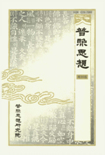학술논문
頓悟漸修의 요가 철학적 성격
이용수 312
- 영문명
- The Yoga Philosophic Characteristic of 'Sudden Enlightenment with Gradual Cultivation'
- 발행기관
- 보조사상연구원
- 저자명
- 정승석(Jung, Seung Suk)
- 간행물 정보
- 『보조사상』普照思想 第35輯, 543~576쪽, 전체 34쪽
- 주제분류
- 인문학 > 불교학
- 파일형태
- 발행일자
- 2011.06.30
6,880원
구매일시로부터 72시간 이내에 다운로드 가능합니다.
이 학술논문 정보는 (주)교보문고와 각 발행기관 사이에 저작물 이용 계약이 체결된 것으로, 교보문고를 통해 제공되고 있습니다.

국문 초록
인도 불교의 본류가 중국으로 흘러들어가 선종이라는 하나의 지류를 형성하였다. 인도의 수행 전통에서 선종에 배대할 만한 유파를 찾자면, 그것은 단연 요가 철학이다. 다른 무엇보다도 선종과 요가 철학의 수행론에서 공유하는 요체로 한눈에 드러나는 것은 선정과 삼매이기 때문이다.
선종은 선정(禪定)을 성불의 수단으로 표방한다. 한편 요가 철학은 삼매를 독존(해탈)의 수단으로 표방한다. 수행법으로 보면 선종에서는 선정을 수습하고 요가 철학에서는 삼매를 수습한다. 이 점에서 선정과 삼매는 동질의 노선을 견지한다. 이 같은 노선은 『수심결』에서 지눌이 역설하는 점수론으로 확연히 드러난다.
『수심결』의 핵심 주제는 영적공지심, 돈오점수, 자성문정혜와 수상문정혜이다. 여기서 지눌은 초지일관하여 점수의 불가피성을 역설한다. 요가 철학은 이러한 점수의 불가피성을 지지하는 데 확고한 기반을 제공한다. 『수심결』에서 점수가 필요한 이유로 지목한 것은 습기이다. 그런데 요가 철학에서는 이러한 습기를 더욱 확고하게 주목하고 있다.
단번에 제거할 수 없는 것이 습기이다. 지눌에 의하면, 점수란 깨달음으로 습기를 점차 제거해 나가는 것이다. 요가 철학에서는 다생에 걸쳐 상속하는 습기를 신속하게 정복하지는 못하므로, 삼매에 진입한 상태에서도 지속적 수행이 필요하다고 역설한다.
요가 철학에서 Purusa(순수정신)는 일상적 마음의 본성이자 독존(해탈)의 본성이기도 하다. 신아(神我) 또는 영아(靈我)로 번역되는 이 Purusa는 『수심결』에서 역설하는 공적영지심의 지지 기반이 될 수 있다. 또한 요가 철학에서 분류하는 무상·무종의 삼매와 유상·유종의 삼매는 각각 자성문정혜와 수상문정혜를 지지한다. 특히 자성문정혜의 ‘자성’에 상당하는 관념이 요가 철학에서는 ‘식별지’에 대한 관념으로 드러나 있다. 이와 아울러 요가 철학에서 식별지를 각성하는 것은 돈오점수의 ‘돈오’에 상당하는 것으로 이해할 수 있다.
결국 요가 철학의 수행론은 지눌의 점수론을 확고하게 지지한다. 요가 철학의 수행론은 인도에서 널리 수용되어 왔다. 이러한 사실은 지눌선의 합리성과 보편성을 뒷받침한다.
영문 초록
The main current of Indian Buddhism had flowed into China and formed a branch stream named Zen Buddhism. And Yoga Philosophy is the most suitable tradition of ascetic exercises in India as to compare with Zen Buddhism. Most of all in the theory of exercises, because the remarkable cardinal point common to Zen Buddhism and Yoga Philosophy is Dhyāna(Zen) and Samādhi respectively.
Zen Buddhism claims to stand for Dhyāna as a means of attaining Buddhahood, while Yoga Philosophy claims to stand for Samādhi as a means of perfect isolation, that is, deliverance. In the respect of method in exercises Zen Buddhism practices Dhyāna(contemplation), and Yoga Philosophy practices Samādhi(concentration). From this standpoint Dhyāna and Samādhi adhere to a homogeneous route.
Such a route is revealed definitely as the theory of ‘gradual cultivation’(漸修) emphasized by Jinul(知訥) in his Susimgyeol(修心訣).
The essential themes of Susimgyeol are the mind of com-pletely empty spiritual knowledge(空寂靈知心), sudden enlighten-ment with gradual cultivation(頓悟漸修), the samādhi and prajñā of self-nature gate(自性門定慧), and the samādhi and prajñā of accompanying aspects gate(隨相門定慧).
Here Jinul emphasizes the inevitability of gradual cultivation from first to last. Yoga Philosophy furnishes a firm foundation for supporting such an inevitability of gradual cultivation. It is vāsanā, that is, consciousness-impressions that Jinul indicates the reason why gradual cultivation is inevitable in his Susimgyeol. Then Yoga Philosophy pays attention to this vāsanā more deter-minedly.
The vāsanā is consciousness-impressions, which can never be removed at one try. So according to Jinul, gradual cultivation is to remove vāsanās gradually through enlightenment. In the case of Yoga Philosophy, because vāsanās going on as unbroken series through more than one birth cannot be overcome promptly, it is argued that continuous exercises are needed even in a stage of achieving samādhi.
Purusa(the Self, pure spirit) in Yoga Philosophy is not only the nature of ordinary mind but also the nature of perfect isolation. This Purusa translated as ‘divine self’ or ‘spiritual self’ can support the mind of completely empty spiritual knowledge(空寂靈知心) spoken with emphasis by Jinul in his Susimgyeol.
Yoga Philosophy also classifies samādhis into two groups. One is classified again into two kinds of samādhi, that is, asamprajñāta(unconscious) and nirbīja(seedless). The other is also classified into two kinds of samādhi, that is, samprajñāta(conscious) and sabīja(seeded). Of these two groups, the former supports the samādhi and prajñā of self-nature gate(自性門定慧), while the latter supports the samādhi and prajñā of accompa-nying aspects gate(隨相門定慧).
Particularly the concept of self-nature included in ‘the samādhi and prajñā of self-nature gate’ seems to be equivalent to the idea of viveka-khyāti(discriminate discernment), which is very important in Yoga Philosophy. Furthermore it is possible to understand that to awake the viveka-khyāti in Yoga Philosophy is equivalent to the sudden enlightenment included in ‘sudden enlightenment with gradual cultivation’(頓悟漸修).
In the end, it is certain that the theory of exercises argued in Yoga Philosophy supports the theory of ‘gradual cultivation’ maintained by Jinul. The theory of exercises argued in Yoga Philosophy has been received generally in India. This fact gives support to rationality and universality of Jinul's Zen.
목차
국문요약
Ⅰ. 머리말
Ⅱ. 空寂靈知心
Ⅲ. 頓悟漸修
Ⅳ. 自性門定慧와 隨相門定慧
Ⅴ. 맺음말
참고문헌
Abstract
키워드
해당간행물 수록 논문
참고문헌
교보eBook 첫 방문을 환영 합니다!

신규가입 혜택 지급이 완료 되었습니다.
바로 사용 가능한 교보e캐시 1,000원 (유효기간 7일)
지금 바로 교보eBook의 다양한 콘텐츠를 이용해 보세요!





